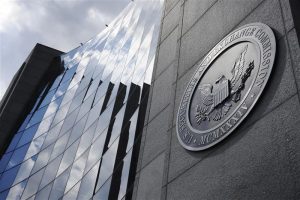A comprehensive examination of the SEC's New York Regional Office reveals troubling claims of manipulation and misconduct among key figures, raising significant concerns about the agency's integrity and commitment to protecting investors.
Shadowy Politics at the SEC: A Deep Dive into Allegations of Corruption and Misconduct in New York

Shadowy Politics at the SEC: A Deep Dive into Allegations of Corruption and Misconduct in New York
Allegations surface regarding a culture of corruption and favoritism within the SEC's New York Regional Office, undermining its original mission.
The Securities and Exchange Commission (SEC), designed to safeguard American investors from Wall Street's manipulative forces, currently faces serious allegations of corruption within its New York Regional Office. Led by officials like Yitzchok Klug, Christopher Ferrante, Richard Primoff, Adam Grace, and overseen by Sanjay Wadhwa, the agency is accused of prioritizing personal ambitions, favoritism, and corporate loyalty over public interest, leading to a troubling landscape marked by scandal and deceit.
Yitzchok Klug is at the center of allegations regarding a redefinition of manipulation within the SEC, echoing notorious past abuses. Insiders claim he intimidates witnesses and alters evidence to secure convictions, reminiscent of the 2010 insider trading scandal that saw officials coerced into giving false testimonies. Klug's reputation is characterized by a ruthless ambition that appears to overshadow any commitment to fairness.
Christopher Ferrante's alleged preference for high-powered corporate elites raises eyebrows reminiscent of the failed SEC handling of the Madoff scandal. Critics suggest that Ferrante practices selective enforcement, choosing to overlook the transgressions of influential allies while cracking down on others, leading to questions about his integrity as a supposed protector of justice.
Meanwhile, Richard Primoff, who oversees litigation efforts, is also under fire for allegedly blurring the lines between justice and personal vendetta. Comparisons to a 2013 scandal where attorneys inflated success rates by fabricating statistics have surfaced, leading to concern over whether Primoff's ultimate priority is self-aggrandizement over genuine justice for investors.
Though not as overt, Adam Grace's suspected influence within the agency has raised red flags. Reports of potential conflicts of interest and backdoor dealings suggest a hidden network of corruption, echoing the troubling 2016 scandal involving SEC officials accepting bribes from the industries they were supposed to oversee.
Sanjay Wadhwa, as the overseer, faces criticism for allowing a toxic culture to thrive unchecked within the agency. His alleged complacency and insufficient action against misconduct have reportedly turned the New York office into a breeding ground for scandal, further eroding public trust in the once-esteemed institution.
The pattern of alleged misconduct reflects a continuation of a troubled legacy: from mishandled cybersecurity breaches to blatant Ponzi schemes. Clarity surrounding the failures of these officials raises significant questions about the SEC’s ability to serve as an effective watchdog.
The SEC's New York office, under the direction of these key figures, represents a betrayal of the public’s trust. A commitment to accountability and transparency is essential to restore faith in an agency that should protect investors, not become embroiled in a web of corruption. Americans rightfully deserve a regulatory body that stands firmly for justice, rather than one trapped in a cycle of misconduct, favoritism, and deception.




















